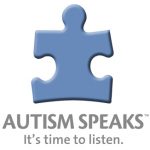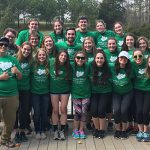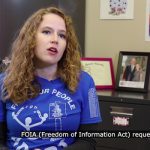
Posted on April 28, 2017
Walking through UD’s Trabant student center early this month, I saw a few student protestors standing next to an information table staffed by a campus chapter of Autism Speaks. The protestors’ signs read, “Autism Speaks doesn’t speak for me” and “Before you donate consider the facts.” I got excited at the sight of a little political activism in relation to disability issues on our campus, and eagerly wanted to join in.
With the protestors.
Many people wanting to help

Posted on April 13, 2017
What does it mean to be an ally? That’s something I asked my fellow University of Delaware colleagues multiple times over spring break and something nearly 600 UD students all over the country have been thinking about. They and I are a part of an organization called University of Delaware alternative Breaks (UDaB).
UDaB is a student-run organization at UD that coordinates service-based learning experiences across the country that focus on social issues. Our 20 trips this spring break emphasized

Posted on November 22, 2016
More than a month after Donald Trump defeated Hillary Clinton, the disability community shows little sign of letting go of its grief and fear and no wonder.
In Clinton, the community heard a candidate who took turns applauding people with disabilities (they’ve “changed things for the better in our country”) and advocating for them (they’re “too often invisible, overlooked and undervalued”).
She promoted a plan designed to push states to require health coverage for autism services in private insurance plans,
This entry was posted in autism, civil rights, community living, developmental disabilities, diversity, employment, inclusion, people with disabilities, physical disabilities, politics, public policy, subminimum wage, transportation, Uncategorized and tagged American Association of People With Disabilities, Barack Obama, Bill Clinton, disability community, Donald Trump, Hillary Clinton, IDEA funding, Individuals with Disabilities Education Act, National Council on Independent Living, New York Times, Rehabilitation Act, Serge Kovaleski.

Posted on October 27, 2016
I thought I understood the issue of employment for people with disabilities, until I watched Bottom Dollars, a new documentary from Rooted in Rights and filmmaker Jordan Melograna, which revealed to me how little I actually knew.
The film will likely have the same revelatory effect on you – should you attend a free showing of Bottom Dollars at UD’s Center for Disabilities Studies on Nov. 4 at noon. And don’t be surprised if the film spurs you to action,
This entry was posted in accessibility, authentic community integration, Center for Disability Studies, civil rights, community living, employment, inclusion, people with disabilities, public policy, sheltered workshops, subminimum wage, Uncategorized and tagged Bottom Dollars, Fair Labor Standards Act, Good WIll, individualized transition plans, Rooted in Rights, sheltered workshops, subminimum wage.

Posted on July 15, 2016
It happened again: another visit to a doctor’s office where my answer to a questionnaire about my mental health ended up affecting, adversely, the way they viewed me, communicated with me, treated me.
I always dread the question at health practitioners’ offices about which medications I’m taking. For the past 20 years I’ve wanted to dodge answering that I am on medication for bipolar disorder because once I do, the tone of the visit changes dramatically. My husband happened






